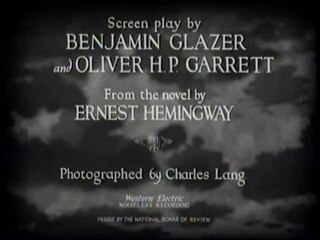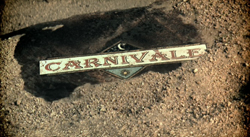A soap opera, daytime drama, or soap for short, is typically a long-running radio or television serial, frequently characterized by melodrama, ensemble casts, and sentimentality. The term "soap opera" originated from radio dramas originally being sponsored by soap manufacturers. The term was preceded by "horse opera", a derogatory term for low-budget Westerns.
Passions is an American television soap opera that originally aired on NBC from July 5, 1999, to September 7, 2007, and on DirecTV's The 101 Network from September 17, 2007, to August 7, 2008. Created by screenwriter James E. Reilly and produced by NBC Studios, Passions follows the lives, loves and various romantic and paranormal adventures of the residents of Harmony, a small town in New England with many secrets.

Home and Away (H&A) is an Australian television soap opera. It was created by Alan Bateman and commenced broadcast on the Seven Network on 17 January 1988. Bateman came up with the concept of the show during a trip to Kangaroo Point, New South Wales, where he noticed locals were complaining about the construction of a foster home and against the idea of foster children from the city living in the area. The soap opera was initially going to be called Refuge, but the name was changed to the "friendlier" title of Home and Away once production began.
A cold open is a narrative technique used in television and films. It is the practice of jumping directly into a story at the beginning of the show before the title sequence or opening credits are shown. In North American television, this is often done on the theory that involving the audience in the plot as soon as possible will reduce the likelihood of their switching from a show during the opening commercial. A cold open may also be used to recap events in previous episodes or storylines that will be revisited during the current episode.
A title sequence is the method by which films or television programmes present their title and key production and cast members, utilizing conceptual visuals and sound. It typically includes the text of the opening credits, and helps establish the setting and tone of the program. It may consist of live action, animation, music, still images, and/or graphics. In some films, the title sequence is preceded by a cold open.

In a motion picture, television program or video game, the opening credits or opening titles are shown at the very beginning and list the most important members of the production. They are now usually shown as text superimposed on a blank screen or static pictures, or sometimes on top of action in the show. There may or may not be accompanying music. When opening credits are built into a separate sequence of their own, the correct term is a title sequence.

Carnivàle is an American television series set in the United States Dust Bowl during the Great Depression of the 1930s. The series, created by Daniel Knauf, ran for two seasons between 2003 and 2005. In tracing the lives of disparate groups of people in a traveling carnival, Knauf's story combined a bleak atmosphere with elements of the surreal in portraying struggles between good and evil and between free will and destiny. The show's mythology draws upon themes and motifs from traditional Christianity and gnosticism together with Masonic lore, particularly that of the Knights Templar order.

The ABC Sunday Night Movie is a television program that aired on Sunday nights, first for a brief time in 1962 under the title Hollywood Special to supposedly replace an open time slot for the TV show Bus Stop, which was cancelled after March 1962. It then began airing regularly under its more commonly known title from late 1964 to 1998, on ABC. Since 2004, it has aired sporadically as a special program, now titled the ABC Sunday Movie of the Week, though as of the 2011-12 television season, the only films in this timeslot were aired under the Hallmark Hall of Fame banner, which transferred to ABC in that season. However, in 2014, The Hallmark Hall of Fame moved exclusively to cable on the Hallmark Channel. As a result of this, the Sunday Night Movie is now exclusively relegated to two special holiday movies, The Sound of Music every holiday season and The Ten Commandments every Easter.

The Wire is an American crime drama television series created and primarily written by American author and former police reporter David Simon for the cable network HBO. The series premiered on June 2, 2002, and ended on March 9, 2008, comprising 60 episodes over five seasons. The idea for the show started out as a police drama loosely based on the experiences of Simon's writing partner Ed Burns, a former homicide detective and public school teacher.
A clip show is an episode of a television series that consists primarily of excerpts from previous episodes. Most clip shows include a frame story in which cast members recall events from past installments of the show, depicted with a clip of the event presented as a flashback. Clip shows are also known as cheaters, particularly in the field of animation. Clip shows are often played before series finales as a way to summarize the entire series, or once syndication becomes highly likely as a way to increase the number of episodes that can be sold. Other times, however, clip shows are simply produced for budgetary reasons.

Perfect Strangers is an American sitcom that ran for eight seasons, from March 25, 1986, to August 6, 1993, on the ABC television network. Created by Dale McRaven, the series chronicles the rocky coexistence of midwestern American Larry Appleton and his distant cousin from eastern Mediterranean Europe, Balki Bartokomous.

Neighbours is an Australian television soap opera that has aired since 18 March 1985. It was created by television executive Reg Watson. The Seven Network commissioned the show following the success of Watson's earlier soap Sons and Daughters. Although successful in Melbourne, Neighbours underperformed in the Sydney market and was cancelled by Seven four months after it began airing. It was immediately commissioned by rival Network Ten for a second production season, which began screening on 20 January 1986. Neighbours became the longest-running drama series in Australian television history. In 2005, it was inducted into the Logie Hall of Fame.
"Can You Tell Me How to Get to Sesame Street?" is the theme song of the children's television series Sesame Street. It is the oldest song in Sesame Street's history, dating back to the show's beginning on November 10, 1969, and has been used as the title song in every episode of the show.

A television show, TV program, or simply a TV show, is the general reference to any content produced for viewing on a television set that is traditionally broadcast via over-the-air, satellite, or cable. This includes content made by television broadcasters and content made for broadcasting by film production companies. It excludes breaking news, advertisements, or trailers that are typically placed between shows. Television shows are most often scheduled for broadcast well ahead of time and appear on electronic guides or other TV listings, but streaming services often make them available for viewing anytime. The content in a television show is produced by one of two production methodologies: live taped shows such as variety and news magazine shows shot on a television studio stage or sporting events The other production model includes animation and a variety of film productions ranging from movies to series. Shows not produced on a television studio stage are usually contracted or licensed to be made by appropriate production companies.

The Neighbours theme song is the theme tune to the Australian soap opera Neighbours. Composed by Tony Hatch with the lyrics written by his then wife, Jackie Trent, it was once voted the world's most recognised television theme song. Neighbours was originally recorded by Barry Crocker, who also recorded the updated version. Subsequent versions have been recorded by a variety of artists.

Days of Our Lives is an American television soap opera that aired on the network NBC from 1965 to 2022 and currently streams new episodes on Peacock. The soap is one of the longest-running scripted television programs in the world, airing nearly every weekday since November 8, 1965. A co-production of Corday Productions and Sony Pictures Television, the series was created by husband-and-wife team Ted Corday and Betty Corday. During Days of Our Lives' early years, Irna Phillips served as a story editor for the program and many of the show's earliest storylines were written by William J. Bell, who would depart the series in 1975 to focus full-time on The Young and the Restless, which he created for CBS in 1973. Following the 2007 cancellation of Passions, Days of Our Lives remained the only soap opera airing on NBC. On August 3, 2022, NBCUniversal announced that it would relocate the series exclusively to its Peacock streaming service beginning September 12 after 57 years on the network and leaving NBC as the only Big Three network without a daytime serial.
"Curriculum Unavailable" is the 19th episode of the third season of the American comedy television series Community and the 68th episode overall. It was written by Adam Countee and directed by Adam Davidson. It originally aired in the United States on May 10, 2012 on NBC.

The title sequence of the HBO fantasy television series Game of Thrones that introduces every episode serves as a guide to the physical landscape of the world of the series. It changes depending on the locations visited in the particular episode it introduces. The title sequence was created by Elastic for HBO, and is accompanied by a theme composed by Ramin Djawadi.
"We Light the Way" is the fifth episode of the first season of the fantasy drama television series House of the Dragon, a prequel to Game of Thrones. Its title is the motto of House Hightower, one of the fictional noble families featured in the series. The episode was written by Charmaine DeGraté, and directed by Clare Kilner. It first aired on HBO and HBO Max on September 18, 2022.
"The Lord of the Tides" is the eighth episode of the first season of the fantasy drama television series House of the Dragon, a prequel to Game of Thrones. The episode was written by Eileen Shim and directed by Geeta Vasant Patel. It first aired on HBO and HBO Max on October 9, 2022.










